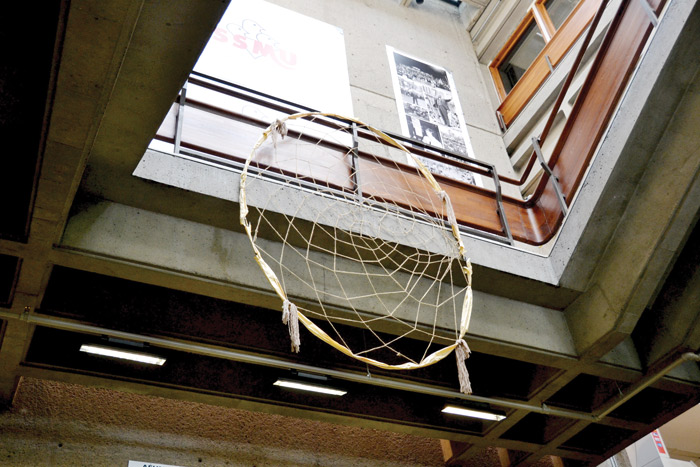The Social Equity and Diversity Education Office (SEDE), held its fifth annual Indigenous Awareness Week from Sept. 21 to Sept. 25, with events focusing on themes such as truth and reconciliation, sovereignty, and resisting gendered and state violence. The week was hosted in partnership with on-campus indigenous student groups, including the Aboriginal Law Students’ Association (ALSA), the First Peoples’ House, KANATA, and Indigenous Student Alliance.
The first panel event of the week featured Elder Fred Kelly (Kizhebowse Mukwaa), a practitioner of Sacred Law, who cleared misconceptions about the ownership of land in Canada.
“Treaties say that we relinquished, surrendered, and ceded our territory,” Kelly said. “This is impossible [….] the law of the land constitutes you be part of that land. How can you sell yourself, how can you sell your grandmother? You belong to it; you can only agree to share. That’s what we did.”
Kelly sees a path for the future of Canadian and indigenous legal reconciliation.
“You are going to start to see traditional law […] and how it must equate with other laws,” Kelly said. “How you’re going to do that is to harmonize the administration of these laws, because Canada’s laws are not for negotiation, and we’re not interested in that.”
Michael Loft, associate professor of Social Work at McGill, spoke to the responsibility of the Canadian government to honour treaties made with indigenous peoples, in his speech “Reflections on Truth and Reconciliation,” on Thursday evening.
“[Indigenous people] gave up plenty of land,” he said. “We made agreements with the Crown […] to get medicine, to get food […] because our world was changing, and we knew that. Modernity was happening and the chiefs knew that [….] Those agreements were eventually forgotten. But we don’t forget them [….] That’s what I expect out of the Canadian state, to honour those treaties.”
Another key aspect of reconciliation, according to Loft, is developing mutual respect between indigenous communities and the Canadian government. Loft illustrated that there had been respect between 16th Century explorers and indigenous communities.
“If we could get back to how we were doing things in 1534, with Cartier– we fed his men, we healed them from scurvy,” he said. “Let’s get back to that. That’s what you call respect. We didn’t have to act like that, but we did.”
In closing, Loft called for an increased cooperation from the Canadian population on indigenous issues.
“You guys aren’t [sic] going away, we’re not going away,” he said. “You have to learn to cooperate, get something solved. We can’t go on the way things are right now.”
Other events held throughout the week included film screenings, creative workshops open to students and faculty, and to conclude, a two-day symposium entitled “Resisting Gendered and State Violence: Indigenous Women’s Activism.”
Allan Vicaire, indigenous education advisor at SEDE and main organizer of Indigenous Awareness Week, pointed to the importance of continuing to promote indigenous awareness at McGill.
“We continue to always do educational programming, but sometimes it’s not enough to just educate,” he said. “We need to really push for that inclusive environment by shifting the culture, how we interact with one another.”
SEDE will host their “Safer Spaces: Indigenous Perspectives” workshop, on Oct. 19. It will cover topics such as the colonial history of Canada, and the current relationship between indigenous people and the federal and provincial governments.
“It's really important that the community really better understands who we are, and how we came to be where we are today,” Vicaire said. “Also, to highlight over the last years the resilience and how we've persevered to keep our culture and identity alive.”
Additional reporting by Shrinkhala Dawadi








